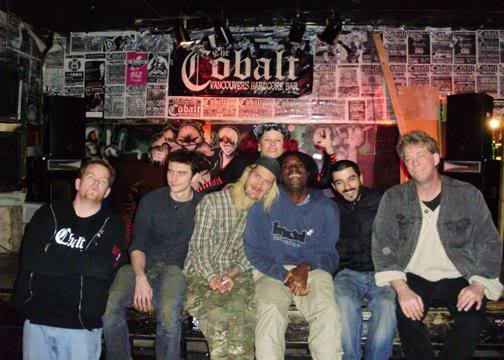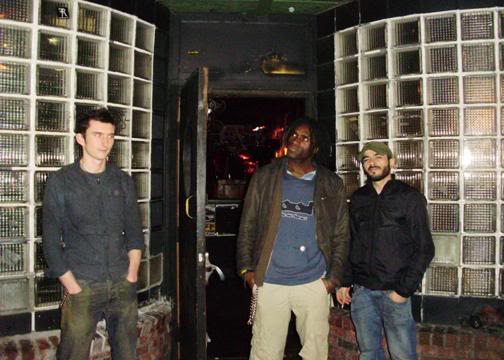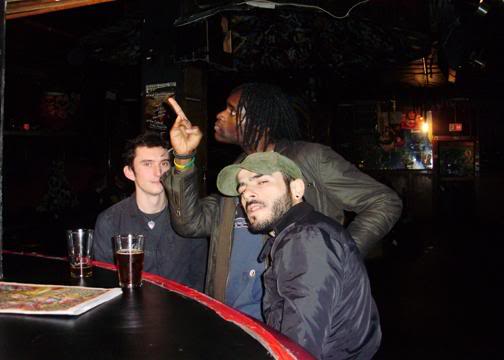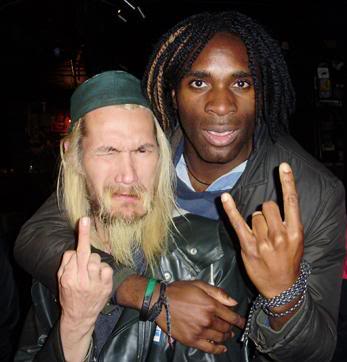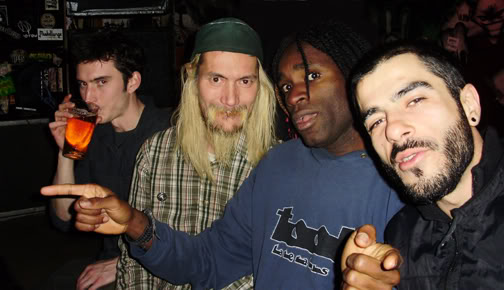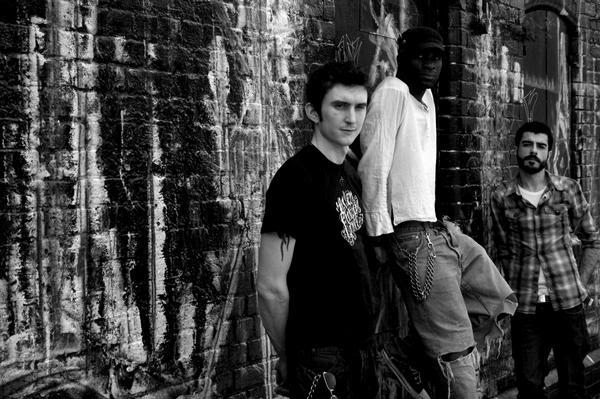DJEVARA
BY “KHAOS”
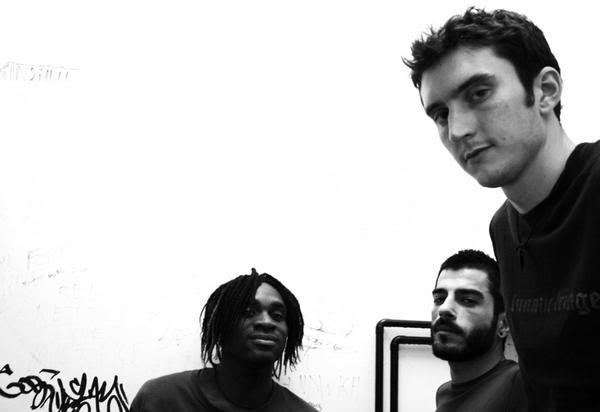
Left to Right: Bass, Sandro, Jeff (Djevara) Photo by: Dina Karklina
I recently had the opportunity to hang out with the UK-based band Djevara. They braved the trip to the Great White North and hung out here in our studio in Delta, British Columbia. Their music has been described in previous interviews “like Rage Against the Machine in a fist fight with Sepultura”. You can hear influences of Pink Floyd, Minor Threat, Jane’s Addiction, Mars Volta, and a lot of others, but they are definitely their own band with their own style. Their music is as unique as the musicians that perform the material. They have a lot to say about our culture and the social issues and controversy that surround our everyday life. Their music is electrifying and highly intense, and is the platform which they use to convey their messages for those who are willing to listen beyond the music. The band consists of Bass (Guitar/Vocals), Jeff (Bass Guitar), and Sandro (Drums).
The band recently came to Canada for the first time, and played shows in Vancouver at The Cobalt, The Bourbon, The Royal Unicorn and
several other venues. We were fortunate enough to be able to hang out with them for the duration of their visit and it was a riot. Between
the guys trying to develop their Canadian accents (and us doing a poor job of trying to imitate theirs), to Bass teaching all the little
kiddies how to play ‘Stuck in the Mud’ on Thanksgiving, to Sandro taking the time to give a drum lesson to my nephew,
teaching the boys the ways to insert the word “like” or “actually,” as many times into conversation as possible…to the
“Wasabi incident” which I can’t mention, hilarity was always present or just around the corner.
The following interview was transcribed from a live video interview recorded by Mike “Red” McLeod.
Left to Right: Red, Jeff, Mr. Chi Pig, Bass, Sandro, Doug, Khaos in the back
Photo by: Kara BeanerPunk Globe: So, Djevara, pronounced “jÚ ver ah,” this is your first trip to Canada. What do you think of Vancouver so far?
Jeff: After you…looks at Bass…
Bass: Why is everyone looking at me?
Sandro: Of course, they are going to interview you…Bass is… (Some strange European hand gesture used to signify that Bass is their leader).
Bass: Well, by far it’s the strangest place I’ve ever been in my life. Very, very interesting. Vancouverites have been in turns, generous, very kind and open, bizarre, bad, moronic…
Jeff: Enthusiastic, very giving, very loving, incompetent… (Laughter ensues.)
Punk Globe: That just about says it all!
Jeff: No, no, in general, very nice people.
Bass: Yeah, it is a very different culture. Well, we are from Europe, so it is a very different culture, and it’s very interesting.
Punk Globe: And speaking of different, The Downtown Eastside (DTES), and in particular, Insite. North America’s only safe injection site, are a big deal here. What do you think about it?
Jeff: The safe injection site is a good idea. We were all, at first, taken aback. The stuff is in your face. The drug problems, the homelessness, the social issues…it’s just bang…it’s there…you can’t avoid it. In London it’s very easy to avoid. You see it, it’s just not there. But here, it’s very in your face and I think the safe injection site, it’s nice to see. We’ve met people who work at the places on the DTES and it’s nice that people are actually trying to do something about it. It’s very harsh. For me it was very harsh to see the streets. It’s so visible and affects so many people.
Bass: I think one thing, and it comes back to your first question about Vancouver is that Europe is a big place, not physically, but in terms of diversity and the number of people. One thing that is certainly clear is the social divisions are a lot vaguer, a lot blurrier, whereas when you come to North America you realize that there are huge gaps in social divisions. And then you’re talking about economic divisions between the have’s and have nots and it’s very stark just walking down DTES for instance, in a country as wealthy as Canada it is astonishing for us to see some of the levels of poverty that we saw. But, at the same time, walking down the same street, not really feeling in danger physically.
Jeff: Which was a bit bizarre for the seriousness of the problems, there is a low level of hostility which you would not find in London. You don’t find the level of impoverishness (sic) on the streets but you feel very threatened most of the time.
Bass: So yes, it is a strange sort of contrast.
Punk Globe: Where else have you toured in the past? How does the music scene compare to other places that you have been?
Jeff: Well, we’ve been all over the UK, obviously. There are pockets in the UK that are quite varied, but there’s a scene there, definitely. We’re all a bit out of touch. None of us watch television, MTV or the radio, so I couldn’t tell you what is big in the UK right now, and in Mainland Europe there’s a really healthy appreciation for what’s different. People go to a venue and are kind of excited about it. In the UK, generally people don’t go unless there is something they are already familiar with like the Rolling Stones, or My Chemical Romance…I’m not sure if that was the point.
Punk Globe: Djevara…Tell me about your name. What is the meaning behind it?
Bass: It’s very simple. I met this guy at Reading Festival once. He was very stoned on various things and….do you only get stoned on marijuana or the other things as well… (Laughter)
Punk Globe: Cut! (Laughter)
Bass: So he was telling me about his travels in parts of Asia and he talked about the Djevara, which is this ancient Asian legend as far as I can make out, about the end of intolerance and the beginning of justice. At the time we were recording "Havoc," so I thought, I wish that we had a band name like that, and then I thought all right, that’s my band name then. So it seemed to fit and nobody can pronounce it. It’s Djevara, DJ evera, Gavara, Day jevara. There was one time that we were getting lots of hype on Radio 1, and the producer of Radio 1 rock show. . . which is to the people on the other side of the world, really important in the UK. The producer actually rang me up and said I’m really excited about your band…we can really do stuff, blah, blah, blah….She says, the only thing I want you to change…and then she had a list of four things she wanted to change, and one of them was the band name. She says with that band name, we can’t do anything for you. We have to change it. I actually had the conversation with Jeff and said, should we really rethink it and then we thought wait a minute…what are we doing? What is the point? Why are we changing our name? This is who we are and what we believe and with the list of other things they wanted us to change we were thinking…why? What’s the point of them being interested if they want to change everything?
Jeff: They should just put an ad in the paper saying we need four people who conform to these ideas and want to be called this.
Bass: They all have the same concept with other labels they all want to change something. No, the bass player should be female…the drummer has to be replaced…You know what I mean? They’ve all got their list of stuff and then you think, well, just make your own band then. But I think that everybody is so desperate that they usually do, do it. Everything… but the problem is that I’ve met too many people. I actually know people who are on major labels and then ten years later they hate music. I never want to be someone who hates music! So as tempting as they are with all that it’s like, wait a minute, one day I’ll hate the music I made….no. You can think that you are better now; you might think that, you might have done something better, but you always have to look back and go, at the time, yeah, I was proud of that. You know, wherever you get to later on, but at the time you were proud of that. Because we all improve, we all change things and that’s different now, but it’s a snapshot, and that’s all it is. A concert is a snapshot of the band as it was at that time. A memory that people take away, a record is a document. It doesn’t mean that that’s forever; it’s like a photo, but a musical photo that you keep and that’s really important.
Left to Right: Jeff, Bass, Sandro (Djevara)
Photo by: "KHAOS"
Punk Globe: How was crossing the border and going through customs? What is your view of our post 9/11 world?
Bass: Well, it’s absolutely ridiculous coming. In the country I was born in, I had to explain several times why I was going on holiday to another peaceful country which is actually a member of the commonwealth. Everybody, apart from Jeff, actually was stopped for a brief interrogation.
Jeff: I was stopped in Canada, actually.
Bass: That’s true.
Jeff: I was asked how much money do I have and why didn’t I have more?
Punk Globe: Why didn’t you have more? (Laughter)
Jeff: BECAUSE I’M BROKE! But the implication was how are you going to survive. What are you going to do? Basically, how can we let you into this country on $200.00?
Bass: Anyway, so it’s about paranoia, it’s about fear mongering, it’s about whatever. I’ve been random checked on every flight I’ve been on in the last ten years.
Punk Globe: Have you been strip searched?
Bass: Um…I haven’t been strip searched.
Punk Globe: You’re lucky…just don’t lose your ID!
Bass: Yeah, so that’s another thing to look forward to possibly. But, the point is, there’s a lot of emphasis on a lot of things, which I don’t know, I haven’t met anyone who feels safer now. I think it’s all about racheting up fear and paranoia and so on, more and more. Until the only thing that can result is loss of freedom and less understanding and less peace and more insecurity. It’s sort of a circle and yeah, so it’s not fun to get through immigration and security and it certainly doesn’t help people get together.
Punk Globe: I read on your website that the band donates a percentage of your projects to charities. Amnesty International is obviously a big one for you guys and I know there were others. What can you tell me about the motivation behind your giving?
Bass: That’s probably one thing that was instituted by me. It’s just one thing that I thought, if I was going to be in a band and it was something I was doing, there were so many other things that were really important to me. I didn’t want to feel that, well, it was my compromise. If I’m going to commit so much time to the band, I still want to support these other things and so the compromise is that I can commit to the band, but then at least I know that it’s not just me going on some ego trip. I’m still doing something about some of the things because if I wasn’t in the band I would be doing something about some of those issues. And it’s consistent with the ideals that the band was set up about originally. It’s not that it specifically or necessarily endorses everything about all the organizations, but it’s more of a statement of trying to be something that’s a positive force in the world, and it’s just something that’s been part of the band from when it started. Everybody for instance, in the band, has their own ideas about the parts that are important to them. It’s just something that was a central part of the way it started and kind of important to me in particular.
Punk Globe: I know that you guys are involved in a couple of other projects. I know that Bass came from a band he started in University when he first started to learn guitar. That band was called “Suck.” The band “Sour Grapes Project” led to Jeff playing with you in Djevara. I’ve also heard of something called “The Low Fidelity Disconnect.” What can you tell me about these projects?
Jeff: We’ve got The Low Fidelity Disconnect back in North London. It’s a warehouse. Essentially, we started off as a rehearsal studio for us, but it just kind of expanded in the last two years. We have a number of other bands who regularly rehearse there, and we’ve had a number of live showcases, gigs, parties, whatever you call them. We call them showcases. It’s essentially a free event. Three or four bands that we like, music that we know is good, in a setting where there’s no bar, there’s no security, there’s no money in the door. It’s completely free. You bring your friends, you bring your own beers or whatever you want and you enjoy it. You don’t have to pay, so you just enjoy it. We also do art lessons. It’s basically a communal art space. We have free art lessons, free art jams, free exhibitions, free showcases, and a number of other services. The idea is to be affordable for musicians and artists because they generally tend not to have very much money, but the idea is more that it’s a useful resource, but it’s supposed to foster a common shared sense of creativity. So you’ve got painters, and musicians and videographers and photographers all working together and inspiring each other; so you’ve got some live music so photographers might want to take photos of that, make films of that, bands have got rehearsal space which is also a nice set for a venue, so you’ve got a recording artist and a film and loosely that’s what it is.
Punk Globe: And the Sour Grapes Project?
Jeff: I actually was in Sour Grapes Project before Djevara. It’s something that started while we were at University.
Bass: I’m not in Sour Grapes Project! My brother Zebedee is in Sour Grapes Project.
Punk Globe: Your twin brother.
Jeff: I was getting too confused. They look so similar.
Punk Globe: Yes, I can see they’re quite amazingly like each other.
Left to Right: Jeff, Bass, Sandro (Djevara)
Photo by: "KHAOS"
Bass: We’re identical.
Jeff: I joined Sour Grapes Project as a band in University and I came into Djevara as a result of that. That’s something very different.
Bass: I mean, I think a lot about these, I mean apart from side projects bands and so on, is I’m kind of sick and tired of hearing people complaining about the way the world is, but not actually necessarily doing things, and realizing that the message we were trying to do with Djevara is about being proactive and about…OK, we’re fighting about lots of things in the world but we’re also being positive in the sense that’s like, you know, you want to do something, you do it. We set up a record label originally to put out our own album, but we noticed that there were other bands who also had a similar kind of attitude, not necessarily with the same kind of, you know, being in a band doesn’t necessarily mean you know how to put out a record, so…but you might have the same kind of you know, energy or attitude and so we knew some good bands and started putting out the records, and it’s about this idea of you know, do it. Actually do something. And the same with The Low Fidelity stuff. “Genin Records” label and the band and so on, in a sense, it’s trying to be bigger than just this generic band concept.
Jeff: There are so many ideas you can’t fit it all into one thing, one container.
Bass: Life is about being lived and about being all you can be in a sense. And funnily enough in that way, it comes back to the original, almost these original hardcore concepts, that came out of Washington, DC. You know, that positive…you know…like talking about straight edge, which is something that got misinterpreted. It was never about being a teetotaler or rejection of drugs, it was about being in control of your life. It was about saying you decide. (For yourself!)
Punk Globe: I’ve had the opportunity to see several of your live performances now, and I can honestly say that I have quite enjoyed them. Even watching the crowd was an interesting experience. There were punks in the pit moshing, metal heads banging, and generally, all the peeps were really enjoying your music. It’s interesting that there was something almost genre-defying about the experience, meaning it spoke to people of many different “scenes.” Your music fits so many categories, but is not clearly defined by one. I’m curious to what your views are on this phenomenon.
Bass: You know what? I’m happiest to hear when people come up to me and say I saw your band by accident and I don’t usually listen to this kind of music, but I really enjoyed your band. I think two things when people say that. I think it’s a very strange thing to say that you don’t listen to a particular type of music because you’ve already done this whole categorization thing already, but then they say, okay, but they did enjoy that. And I think at least they listened to it as music. They’ve forgotten all the barriers they’ve put up and they’ve actually heard the music instead of just hearing the label…It’s punk, it’s metal, it’s rock, whatever it is, and then “do I allow myself to enjoy that?” They’ve actually let some things come in under the door, under the carpet and it hits them somewhere else. So I think all of us would say, yeah, good, yes…because that’s what it is. It’s just music and apart from everything else and all the things it is actually about the music. That’s it, that’s what we’re all in common feeling. So it’s got nothing to do with a particular genre. It would be accurate to say that Sandro enjoys hardcore, it’s not a useless statement. I enjoy, well whatever I enjoy…sort of punkish metal, hardcore, rock. Jeff enjoys progressive rock and whatever we enjoy…and there are genres which are accurate to describe music we broadly enjoy, but we are fans of music.
Sandro: And particularly, live music. I think this is one of the main things why Djevara is kind of an interesting act, is there is a…you know…if you are listening to the album you can really feel a different vibe. While you are actually looking at and watching the band, I think, yeah, that’s what Djevara wants to bring back is the live thing. Most of the bands today aren’t interested in touring. The raw energy of the 60’s, 70’s.
Bass: I don’t understand this, because there’s such an opportunity to have an experience when there’s a live performance. Why… is just so arbitrary. Why is it so every day? Just go onto the stage and like…that might be the last day of your life. I don’t get it. You’ve gone to enjoy something. You’ve gone to feel something. It’s really important because there’s people communicating, and the one thing that I’ve always felt about playing live, is that in this world, especially this world we live in now, it’s the only place I really feel I’m actually myself. I don’t have the social…think about it. I can get up, say the stuff which is really deep and personal, shout it at the top of my lungs, and I’m not arrested for being a crazy person? Where else can I do it? Go into the street and start telling you what I really think about the world, screaming at the top of my lungs? I’m a fucking nut. But for some reason, if I take a guitar, crank it to maximum, get some other people on the stage with me and shout it…yeah, that’s fine….good, good band, thank you man…really enjoyed your set…I’ll buy an album. That’s normal, so who’s fucked up? So actually, it’s the only place where I feel free to express and I’m just kind of obvious because I’m doing the lyrics and the vocals. I actually think it’s the same for these guys. Different outlet but you see aspects of these people that they can’t express anywhere else in their lives.
Punk Globe: What do you think is happening to the music scene? We actually spoke about this issue in a conversation earlier about how people aren’t appreciative of musicians and how the bigger bands are like the McDonalds of musicianship. People are willing to pay good money for these shows, but with smaller bands it’s hard to get people to come out for shows anymore.
Bass: Well, there has been a general devaluing of live music and musicians that has been going on ever since the late 50’s and 60’s-70’s…ever since club owners realized that they could get a DJ and pay one guy instead of four guys, and play music and people would come. In fact I was reading a very interesting essay which said that people used to reject the idea of going to a place if they had a DJ. They were like, “What? Going to a place and someone just plays a record instead of seeing real live musicians?” And people used to say no way. Until they realized that club owners put the price of the drinks down, and then that made people come to see these shows where there were no musicians, and from there it just spiralled. And then I also think that in the alternative scene in particular, post “Nevermind” (Nirvana), you had thousands and thousands of alternative bands coming out who realized there was a career possibility in this, but then the down side was that everyone was doing it and people were doing it for free….
Punk Globe: Or beer…
Bass: Or they were just messing around and everyone was coming in and it devalued it immediately. Imagine, you go to a show, and instead of seeing what you saw in like say in the 50’s-70’s, bands who were actually able to play or entertain, or do whatever and were worth seeing, you had thousands and thousands of well…just druffs (sic) you know…there was no reason for these people to be on stage. They don’t even really particularly like music; it’s just the easiest route to become popular just like everyone else. So then that is what you are going to have. A devaluing of skill.
Jeff: That’s what happens when you make something so accessible, is that there is this kind of a blanket. If you make something that is so broadly accepted, you are inevitably going to lose something of the essence of what made it so brilliant in the first place. What made it stand out, and if you take that and you multiply that by a factor of thousands, then you dilute the essence of what made it so special in the first place. I mean it brings it to many more people but you lose some of the soul at the same time.
Bass: So my point is that some of these people jumped on and it became a fashion and became what you do to be fashionable, and what that does is devalues it because you have got millions of people coming on with different values. Now everybody’s been to all these shows where there’s no reason to be there. There isn’t the real passion, the music isn’t amazing, people go there and they are like, “not bad”. That shouldn’t be your experience when you go to a show. People are there and they’ve got music that they’ve created. They’ve spent hours creating and they’re giving themselves to you; and you should come away from a show feeling like something happened to your life. You know, but that’s not happening to people. And so the value of experience, people are just satisfied with just going. Ya cool, but they forget about it the next week. I’m not satisfied with that. That’s not what I expect. I expect it to touch me somehow.
Punk Globe: Speaking of experiencing… you met the infamous Mr. Chi Pig…
Mr. Chi Pig (SNFU) and Bass (Djevara)
Photo by: "KHAOS"
Bass: Oh my goodness (Laughing), we did!
Punk Globe: …front man for SNFU, and it was a royal treat I’m sure. What impression did he make upon you?
Sandro: First impression…no, you say it.
Bass: No, no, you say it.
Sandro: No, no, I’m asking you because you didn’t know he was from that band, so…
Bass: No, actually I did because somebody shouted it straight away when he was walking down the street.
Sandro: Oh, you did? Oh, OK, I didn’t…so…
Bass: Yeah, yeah.
Sandro: That’s interesting…
Bass: But, you asked about what was the most funny incidences from meeting him probably. Umm, certainly a very strong personality, but you know, on the surface you could talk about his sort of edgy anti-politically correct jokes and his kind of crazy way of speaking, and his approach, and his behaviour with people, but deep down, there’s also that very pure, kind of…well, some of the fundamentals we were saying. This guy is somebody who lived and believes punk rock or whatever you call it, music something. He’s been doing this for years and he’s still coming to shows at the Cobalt on a Monday night, and then he’s going on tour in Canada, you know.
Punk Globe: It’s his birthday today.
All: Happy Birthday Chi!
Sandro: He is a brilliant person.
Bass: Yeah, so it’s like, this guy is for real, um…and it strikes you. Actually it was kind of touching, because he was trying us out, he was trying us out at first. He was like, who are you? Who are you? He was trying everything, you know, he was trying the edgy black jokes, he had a bit of an Italian thing, I don’t know what he had at Jeff, you know, all this stuff…
Sandro: Everything!
Punk Globe: He knocks himself as well.
Bass: Oh he knocks everybody! I’m not saying (it’s bad) but he tries it out. But afterwards he came up and he, I think he was like yeah, OK, you guys…
Jeff: He was almost tearful, he was like, I really, really like you guys.
Bass: Yeah, he was really, really touched and it was really...cause we know we’re a different generation from that, so it’s kind of like, well for me, it’s touching almost because he can see something, that maybe even his people who are his contemporaries don’t really see or respect anymore, which is integrity. Awww, I know we’re going round and round, but it’s…to be honest, Djevara is really simple you know. It’s just about integrity, and that’s it. And that’s how we define the music, the people.
Sandro: That’s what he is, pure people and stuff.
Punk Globe: He’s kind of a Shaman.
Jeff: Very, very clever, very spiritual guy really.
Punk Globe: Yeah, and he totally recognized what you guys had to offer to the music scene, and your energy, and he can feel that.
Bass: So I think, yeah, on a simple level, you can say, oh just a crazy, nutty, oriental guy, but actually he’s a bit deeper than that, and he is certainly unique, which is the word Sandro just looked at me and went “unique”.
Sandro: Yeah, he is. (Laughter)
Bass: And it’s true. But, these are the people that make life interesting.
Punk Globe: I just have a couple more questions to ask. You, Sandro, actually stopped during the middle of the day after you guys were recording and you played drums brilliantly all day, and gave a lesson to an 8 year old boy…
Sandro: Oh wow, what are you gonna say?
Punk Globe: …And it was just amazing. I’m just asking what you have to say to kids that are interested. I mean, it’s like you had such patience with this kid, and what do you think of the musicians coming up, like obviously from an 8 year old who has not has lessons and just natural talent but also what do you have to say to kids that want to pursue music?
Sandro: Well the main thing is, just to follow whatever they feel. Try to push themselves every, every day with whatever they like, and never be influenced by friends or even family. They just have to focus on one thing. That’s what I did when I was 8 years old as well, I started playing music when I was 8 years old because of my parents, and I think this child has been very lucky at the same time because he has very good people around him actually pushing him to do what he likes and… I don’t know, there are so many good reasons to believe in something but in this case you just have to… I don’t know…I’m lost… (snaps fingers) four o’ clock in the morning… (Laughter)
Punk Globe: Fair enough!
Chi and Djevara. Photo by "KHAOS"
Sandro: I don’t know, I think just listen less, and DO whatever they feel. That’s what I think so…
Punk Globe: Stuck in the mud?
Bass: Good game.
Punk Globe: Every Canadian child is going to catch on to that.
Bass: Yeah, they should all be…playing, let’s hope they don’t all get stuck! (Laughter)
Punk Globe: Is there anything left that you want to really push out there about your music and what you have to say? I mean, basically parting thoughts and the future of Djevara, where do you think it’s going?
Bass:Well, I do think what we’re fighting for, in terms of people should…well I can’t say what people should do, but we’re fighting for a situation, where people can access and listen to music based on it’s intention and based on it’s value, rather than marketing, and you know, fashions, and things that have got nothing to do with what’s actually interesting or important about music. Umm, so, yeah, the fight is for the music to find it’s right people and for people in general to be able to access music that has integrity, whether it’s our music or any number of artists who are genuinely good or genuinely making something that is interesting, and is about the human experience, and can connect with you.
Punk Globe: Right then! Well said.
Bass: And also, like Frank Zappa said, “Talking about music is like swimming about architecture”. So listen to music.
Punk Globe: Yes.
Bass: Don’t just read about it.
Punk Globe: Exactly! Well it’s been great hanging out with you guys the last couple of weeks. We should probably try to get an hour or two of sleep before we have to drive you to the airport later this morning!
All: Goodnight!!
DJEVARA CONTACT:-
All information/updates are available our real website and forum, which can be found at:
(www.djevara.co.uk)
(myspace.com/thelowfidelitydisconnect)
(http://www.myspace.com/djevara)
Left to Right: Jeff, Bass, Sandro (Djevara)
Photo by: Dina Karklina

